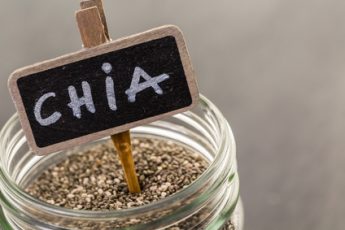Chia seeds are pretty much the definition of a superfood. Highly nutritious, easy to eat and incredibly low caloried, all in one tiny but powerful package.
Pros and Cons of Chia Seeds
Quick Navigation
But it is not without its downsides. Like everything, there is a list of things to consider before you start taking chia seeds. So make sure you finish this article and thinkc arefully before you start taking them.
Chia seeds benefits and side effects
As more research performed on the consequences of chia seeds, the effects of these powerful little seeds only become more apparent. Here is what you can anticipate when you start eating them:
Chia seeds are super high in antioxidants
Recent research from Mexico reports that the antioxidant level in chia seeds might be as much as twice as high as previously thought.
But why should you care about this? Well, antioxidants help fight against free radical production in the body, which is a primary cause of widespread damage, skin irritation and the effects of ageing!
Chia seeds are super high in fibre
So high, in fact, that one serving can contain your entire daily recommended allowance of fibre.
Not only does this help with digestive and bowel health, but it also goes a long way towards balancing insulin levels.
As well as this, chia seeds expand when exposed to the fluid, forming a gel, which increases their volume in the stomach and can make you feel fuller and more satisfied, helping to control your diet.
Chia seeds are super good for the heart
With more Omega 3, fatty acids than salmon and a massive dose of linoleic acid, which helps your body absorb all of the essential vitamins that lead to heart health, it is no surprise that chia has been documented to lower cholesterol levels, inflammation and blood pressure.
Chia seeds are super good for diabetes
Okay, this one is a maybe but the research is so promising we had to include it.
Recent studies on animals fed a diet extremely high in sugar, chia seeds and not much else documented the fact that eating chia inhibited the effects of insulin resistance, keeping the blood levels of the rats fed a high sugar diet stable no matter what.
A separate study on animals who already showed the symptoms of diabetes fed a chia diet showed that chia might actively help inhibit the effects of diabetes, making dealing with the condition much simpler.
(Disclaimer. Don’t stop taking your medication. Research is still ongoing. But it is a fantastic prospect!)
Chia seeds are super good for bone health
One serving of chia seeds (an ounce!) has almost 20% of your daily recommended calcium intake.
Not only that, they incredibly highly concentrated with boron, an element that is hard to find in conventional diets and often supplemented. Boron can metabolise into multiple compounds that the body needs to develop correctly, especially bones.
Chia seeds are super good for teeth
Apart from the minor problem of the seeds getting stuck in your teeth. (Floss picks, people!) Chia seeds are amazing for dental health.
Stuffed with zinc, calcium, vitamin A and phosphorus, chia gives you everything you need to keep your teeth healthy and white. It keeps that gleaming smile in tip top condition.
The risks of chia seeds
Despite these enormous benefits, chia seeds also have a few downsides. There is a minor list of possible side effects to look out for, as well as some small risks to consider.
Side effects of eating chia seeds
- Digestive and gastrointestinal problems: This is the most common side effect, but thankfully the least impactful. It is a regular thing when you switch to a high fibre diet, and tends to either pass in time or solved by cooking the seeds further.
- Allergy issues: Allergic reactions to chia seeds are so rare it is not something you should concern yourself with unless you’ve got specific allergy issues. However, if you have general allergic problems or you are specifically allergic to mustard, oregano, sesame or thyme, you may wish to watch out.
- Blood pressure: Chia seeds thin the blood, which can lower blood pressure and lead to excessive bleeding. Again, this problem is only minor in the vast majority of people. It is not something that will ever notice.
- Diabetes interactions: Like we said earlier, the effect of chia seeds on blood sugar can be significant. If you may have diabetes, talk to your doctor before taking chia seeds.
Finally, when you are eating your chia seeds, be careful. Chia seeds can absorb over 25 times their weight in water, and form a thick, gel like substance when immersed. If not taken correctly, it is possible for the seeds to become stuck in your throat, which could impair breathing and cause further issues.
Final thought. Chia seeds: Good or bad for you?
On the whole, and introduced as part of a balanced diet, chia seeds are more than likely going to be hugely beneficial. As always, remember that they are a supplement to a healthy and varied diet. Make sure that you are eating as well as you can, with plenty of healthy greens and protein.
But if you are eating right, chia seeds can be a fantastic addition to your diet. After all, when you look down the list of pros and cons of chia seeds, it is mostly massive advantages, with only a tiny little list of cons. Pick some up today, and see what this amazing seed can do for you.

